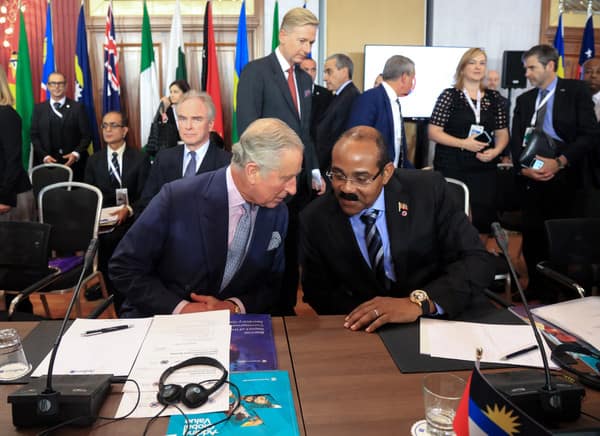
With the upcoming coronation of a new British monarch, The University of the West Indies Five Islands Campus will explore the case for Republicanism in the Caribbean in the next edition of its Public Advocacy series.
The April edition of the series will take place on Monday, April 24, 2023, at 6:30 p.m. with the topic: “To Be or Not to Be: The Case for Republicanism.”
This month’s speakers at the campus’ Public Advocacy Series will be Ambassador Dorbrene O’Marde, Ambassador Anthony Hylton and Dr. Kristina Hinds.
The panel brings together a wide range of experienced individuals in the areas of governance, politics, and reparatory justice.
Ambassador Dorbrene O’Marde is one of the vice chairs of the CARICOM Reparations Commission and chairperson of the Antigua and Barbuda Reparations Support Commission.
Ambassador Anthony Hylton is a Member of Parliament in Jamaica for the constituency of Saint Andrew West and was recently appointed to the Constitution Reform Committee of Jamaica, which is in the process of reforming the country’s constitution, including a review of its head of state.
Dr. Kristina Hinds is a Senior Lecturer in Political Science and Head of the Department of Government, Sociology, Social Work and Psychology at the University of the West Indies (UWI), Cave Hill Campus. Dr. Hinds was sworn into the Senate of Barbados as an Independent Senator in April 2022.
This month’s series will conclude the 2022/2023 series which has explored politics and policies related to Antigua and Barbuda and the wider Caribbean.
The series will end with this exciting topic as several of the contributing countries of The UWI remain constitutional monarchies and are in the process of discussing constitutional reform, including replacing the British monarchy.
The virtual event takes place on Monday, April 24, 2023, from 6:30 p.m. to 8:00 p.m. (Eastern Caribbean time).
Opening remarks will be delivered by Pro Vice-Chancellor and Campus Principal, Professor Densil Williams and followed by the discussion with the panel.
Participants will be able to pose questions directly to the speakers during the discussion segment.
Persons can register online at the campus’ website: https://fiveislands.uwi.edu/publicadvocacyseries
The Five Islands Campus looks forward to a robust discussion as persons join the series for this exciting subject.
Advertise with the mоѕt vіѕіtеd nеwѕ ѕіtе іn Antigua!
We offer fully customizable and flexible digital marketing packages.
Contact us at [email protected]

















Barbados is doing very well since becoming a Republic, and their tourism sector continues to flourish, and so will ours in Antigua & Barbuda. 🇦🇬
GOD SAVE THE KING … 😉
@Brixtonian.
If you believe that Barbados’ economy has improved due to Republicansism then you are mistaken. There is absolutely no connection between the two. Governence is the key. Good governence brings positive results, otherwise you get negative results. Think about it.
I am firmly anti Monachy, however, it would be a bad move for Antigua to become a Republican state under Gaston Browne’s administration.
Gaston wouldn’t hesitate to hand Antigua over entirely to the Chinese and thus making Antigua a terroritry of China. The Chinese already control
what comes and goes out of the sea and airport. Therefore, Antiguans should consider long and hard about the future before removing the King.
Caribbean head of states who are advocating the removal of the King as head of states should demonstrate their convictions by putting principles
before status and boycott the Coronation.
It doesn’t matter one iota whether Antigua and Barbuda becomes a republic or not to the ordinary citizen. What are the benefits, if any, of opting for republicanism and how does it affect the welfare of the common man/woman? This has yet to be proved. The argument that we would have our own head of state instead of the British monarch is true but the question still remains: what is to be gained economically or otherwise that would be of benefit to the state? The answer seems to be the feel-good factor or ‘we have our own head of state’. Fair enough, but what would we be able to do then that we cannot do now? Would the economies of say, Australia, Canada and New Zealand improve if they became republics? If their governments administer wisely then, yes; if they do not then, no. It has nothing whatever to do with becoming a republic or remaining a monarchy, it’s a matter of good governance either way. Best really to put these questions to our leaders.
PS. Am neither pro nor anti monarchy. Indifferent although leaning towards the latter.
Barbados has become a one party state since becoming a republic with a president appointed by Mia Motley. There is not a single opposition MP in Parliament, hardly a step forward for a democratic nation. If the Crown cannot act as a counterbalance to the ruling party, who can?
@Rasta Selassie.
There is no opposition in the Barbados Parliament because of the will of the people through their votes, not because Barbados has become a republic. This is called Democracy, the will of the people. Keep that in mind.
Was the Prince of Wales’s Visit to Antigua and Barbuda, and other Caribbean nations back in 2022 a check on their level of Respect for the Sovereignty of the British Crown?
Since 2021 when Barbados became a Republic, other albeit, wealthy Caribbean countries are seeing the need to follow suit in efforts to:
1. Begin to erase the mental debilitations of centuries of slavery on the Caribbean Island states.
2. To instill confidence in the nation’s nationals, to further boost their productivity and sovereignty to their home nations.
3. To begin to officially finalize their independence, because although most Caribbean nations are independent states, their communities, institutions, organizations, societies and people still show evidence and remnants of colonial rule.
However, there are significant challenges to the Caribbean islands’ new willingness to reform into becoming Republics, specifically for Antigua and Barbuda. These are:
1. Antigua is a very tourism-dependent country, and its economy is un-diverse. Therefore, with few international exports, Antigua’s Balance of Payments Account is very import-saturated. With the country being so heavily dependent on the Bretton Woods’ International Monetary Fund Agreement for funding, it is customary news in Antigua, that the country still owes substantial amount of foreign debt to the IMF for individual projects on the twin island state. Moreover, the country’s GDP is only $1.47 billion, which is $3.37 billion less than Barbados’ GDP of $4.84 billion. With that said, it will be more difficult for Antigua to become a Republic because of its lack of production diversity and reliance on tourism.
2. Compared to Barbados, which is a more wealthy and prosperous country, Antigua is less-developed, and therefore, a shift toward democracy could expose instabilities within the countries governmental system and could further reduce the economic and political outlook of the island.
However, a major element in the decision to transform Antigua to a Republic and to replace the Head of State, and to finally have an Office of the President, is the fact that the Government of Antigua and Barbuda owns majority of the lands. This is in stark contradiction to islands such as Barbados, whose government gave slaves shares of land in agreement for their labor. This was early in the slavery era days of Barbados (however, most of the slaves that got land in this time were of European decent, and some of African decent). However, within the decision the become a Republic, wise institutional investments, and infrastructure planning for all the people of this society is needed to bolster Antigua’s drive to become a global economic powerhouse.
Comments are closed.